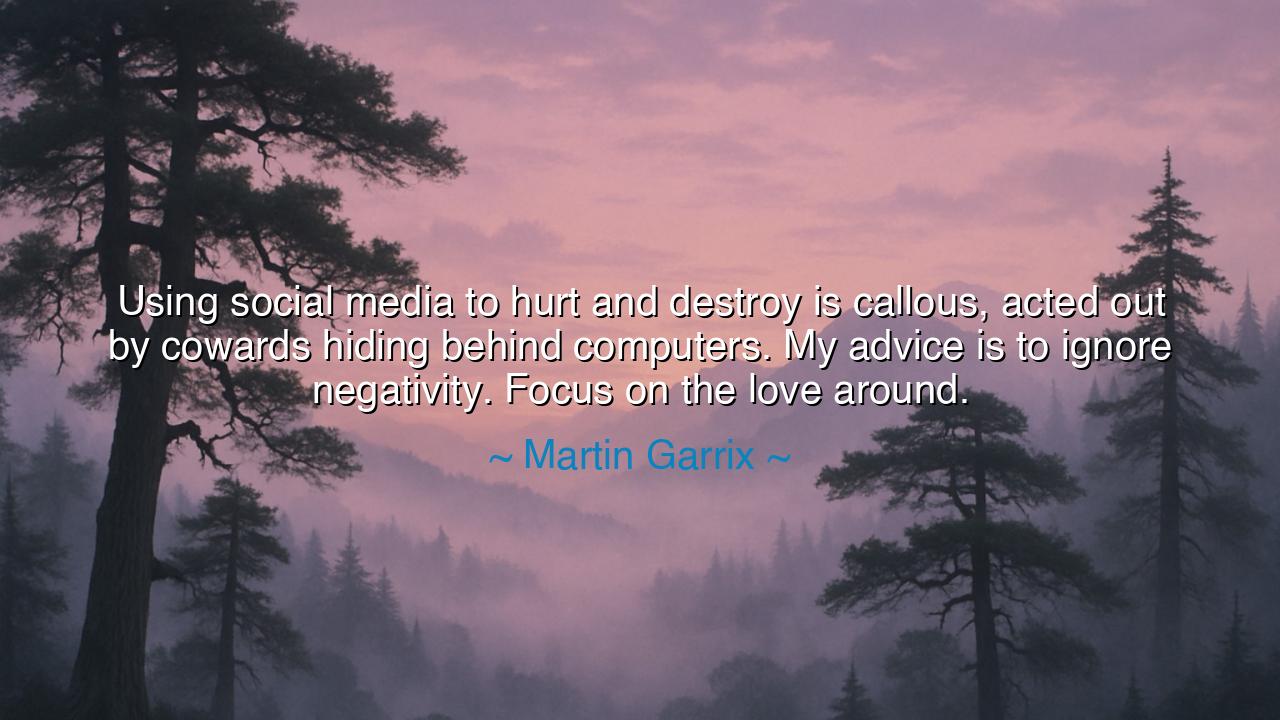
Using social media to hurt and destroy is callous, acted out by
Using social media to hurt and destroy is callous, acted out by cowards hiding behind computers. My advice is to ignore negativity. Focus on the love around.






In the vast and ever-expanding digital world, where words and images travel faster than the wind itself, there lies a force that is both powerful and dangerous. Martin Garrix’s words, "Using social media to hurt and destroy is callous, acted out by cowards hiding behind computers. My advice is to ignore negativity. Focus on the love around," serve as a clarion call to reflect upon how we engage with one another in this interconnected age. His statement speaks to a truth as old as time itself—the harm done through words can be just as devastating as any physical wound, and the true strength of the human spirit is revealed not in the ability to tear others down, but in the choice to rise above negativity and seek the love that surrounds us.
The ancients, in their wisdom, knew that words were not mere tools of communication, but vessels of power. Socrates, the great philosopher, warned against the destructive nature of falsehoods and malice. His teachings emphasized the importance of seeking truth and goodness in all things, recognizing that to sow discord with words was to sow chaos in the soul. In the ancient world, much like today, those who used words to harm were often seen as cowards, hiding behind their positions of power and influence, too afraid to confront their own demons. Garrix’s words are a modern echo of this ancient wisdom, calling us to rise above the hurtful, to turn away from the malice, and to focus instead on the goodness that exists in the world.
Consider the example of Marcus Aurelius, the Stoic emperor whose reign was defined not only by his military victories but by his wisdom and inner peace. In his Meditations, he wrote that we should not be swayed by the opinions of others, for negativity is like a shadow that passes by but does not define us. Marcus Aurelius understood that the world is filled with those who would seek to drag us into conflict, yet the true strength of a man lies not in how he responds to criticism, but in his ability to focus on the love and virtue that he carries within himself. The lesson is clear: the strength of one's character is not tested by external forces, but by the choice to cultivate inner peace amidst the chaos.
In the realm of social media, we face the same challenge today. Platforms that were designed to connect us have often become breeding grounds for negativity, where faceless individuals hide behind screens, using their words to tear others down. Just as Socrates and Marcus Aurelius faced their detractors, we too are bombarded with criticism, hate, and judgment. But the true power lies not in responding with equal malice, but in choosing to ignore the negativity, to rise above it and focus on the love and support that exists in the world around us. Garrix’s words are a call to reclaim the digital space from the forces of division and to fill it instead with the kindness, support, and love that have always been the cornerstones of the human experience.
Consider the life of Mahatma Gandhi, whose resistance to British colonial rule was rooted not in hatred, but in love and nonviolence. Despite the negativity and hatred he faced from those in power, Gandhi chose to focus on the good, to promote peace and understanding rather than retaliation. His life teaches us that the true measure of strength lies not in engagement with negativity, but in the ability to turn away from it and focus on the greater good. His victory was not just over the British Empire, but over the forces of hatred and violence that sought to consume his soul. In the same way, we are called to resist the temptation to engage with negativity on social media, and instead use these platforms to share the love, creativity, and positivity that can heal the world.
The lesson from Garrix’s words is not just one of self-restraint, but of empowerment. By refusing to engage with negativity, we not only protect our own peace, but we take back the power to shape the narrative. Just as Gandhi and Marcus Aurelius understood, our true power comes not from responding to every attack, but from choosing to focus on the good. We must remember that words can build or destroy, and that it is our responsibility to use them to uplift and connect rather than to tear down.
In practical terms, we must engage with social media not as a battlefield, but as a platform for love and creativity. When faced with negativity, we must choose to walk away, to turn our attention toward those who support and inspire us, and to contribute to the positive dialogue that will elevate us all. Like Garrix, who wisely advises to focus on the love around, we must choose to immerse ourselves in the uplifting, in the creative, and in the supportive. Through these choices, we shape not just our own worlds, but the digital world we share with others, creating spaces where kindness and positivity thrive.
Let us remember, in the words of Garrix, and in the teachings of the ancients, that our true strength lies not in responding to hate, but in choosing to rise above it. The power to shape the world rests in our hands, and it is through our words, our actions, and our love that we will bring light to the darkness.






AAdministratorAdministrator
Welcome, honored guests. Please leave a comment, we will respond soon